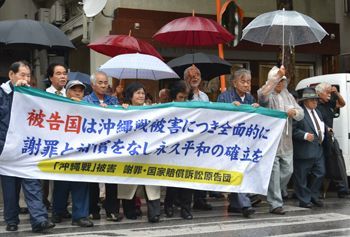War orphan stresses uniqueness of Battle of Okinawa at appeal court demanding apology and compensation from government

The plaintiffs and their attorneys make their case for the first argument in their appeal trial, which began at the Naha branch of the Fukuoka High Court on September 6.
September 7, 2016 Ryukyu Shimpo
On September 6, at the Naha branch of the Fukuoka High Court, the first argument for an appeal trial in which plaintiffs are demanding an apology and compensation from the government to be granted to Battle of Okinawa war victims was held.
The government’s attorney argued that the appeal should be dismissed.
The lead attorney for the plaintiffs Shigeru Zukeyama argued in his opening statement, “If the plaintiffs lose the lawsuit, the damages they suffered during the Battle of Okinawa will be forever lost in the darkness of history. But the fact that the law was not able to protect the weakest people would forever be engraved in history.”
The leading attorney criticized the lower court’s decision for totally rejecting the demand of the plaintiffs without considering the uniqueness of the Battle of the War. He indicated that the Imperial Japanese Army had forced local residents out of shelter caves.
He also mentioned that the lower court’s ruling did not refer to PTSD from the war, and criticized the court for avoiding its responsibility to make a judgement on a unique case.
Tsuru Kinjo, an 80-year-old war orphan living in Kitanakagusuku Village spoke to the court as a plaintiff. She lost seven family members after they were forced out of their shelter cave by the Imperial Japanese army.
Weeping, she told the judges about how she had thought of killing herself. The war orphan plaintiff said, “I want this issue to be resolved while my health is still good.”
The government’s attorney argued that the plaintiffs’ appeal should be dismissed because it was before the enforcement of the national compensation law and the government does not therefore have any responsibility to compensate.
The government’s attorney took the same stance taken in the lower court ruling.
(English translation by T&CT)
Go to Japanese
Previous Article:Request to survey Battle of Okinawa remains in Camp Schwab sent to US embassy
Next Article:Yilan County establishes Naha office to promote cooperation among fishermen
[Similar Articles]
- Naha District Court rules Japanese government not liable for war acts committed under the Meiji constitution
- Dugong lawsuit appealed to U.S. High Court
- Futenma roar appeal dismissed by Supreme Court without issuing a flight ban
- Victims of the Battle of Okinawa to take their case to Japan’s Supreme Court after Japan found not liable in reparation lawsuit
- Futenma noise pollution lawsuit monetary award lowered over 30% in appeal ruling
 Webcam(Kokusai Street)
Webcam(Kokusai Street)


